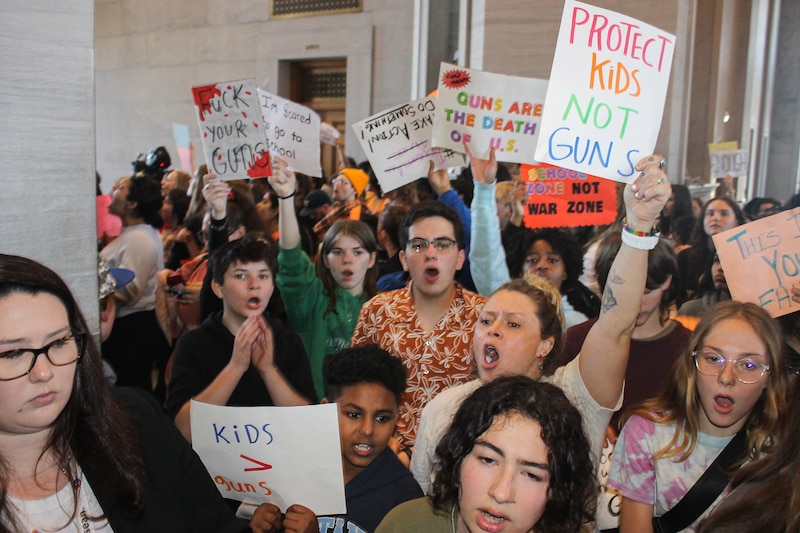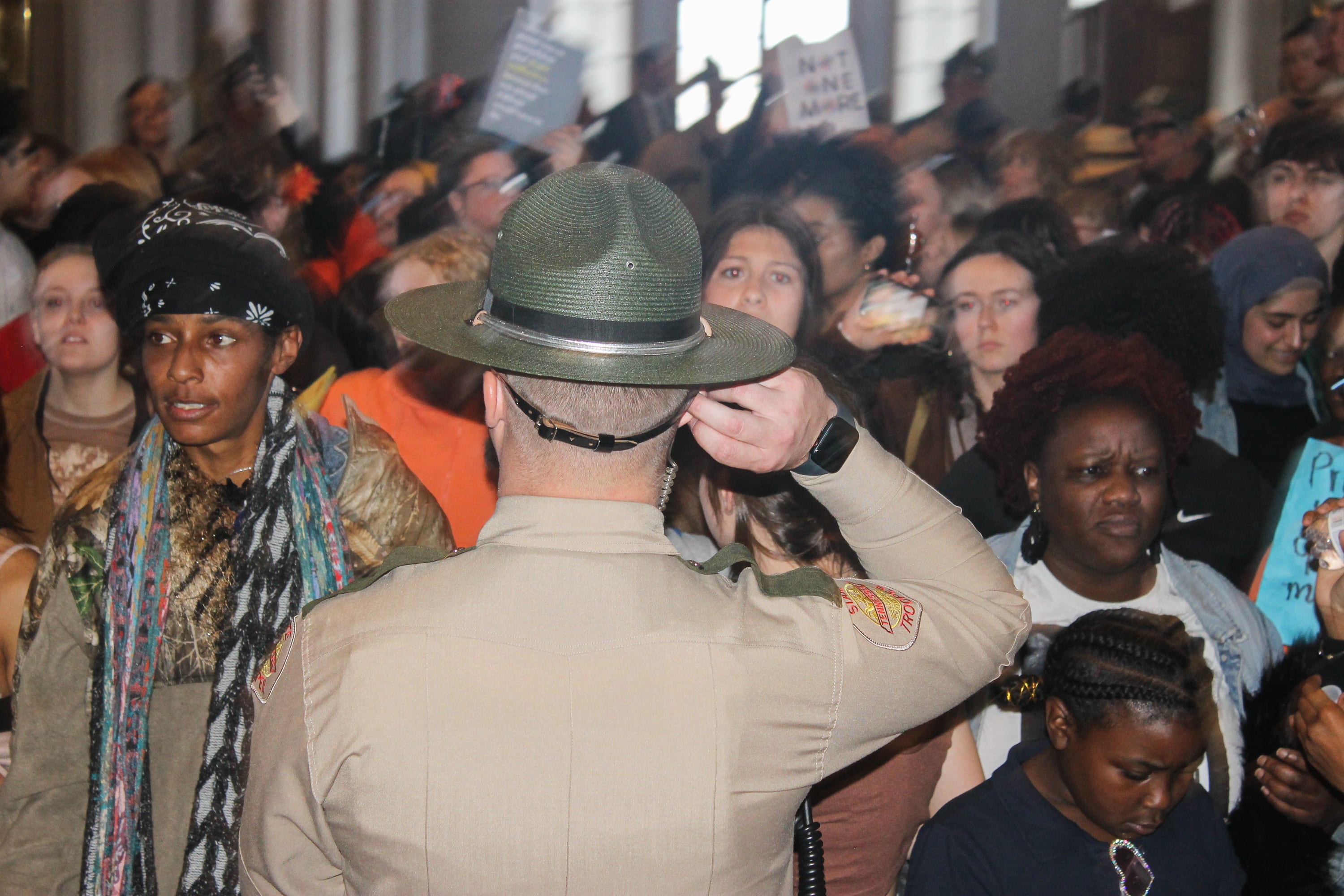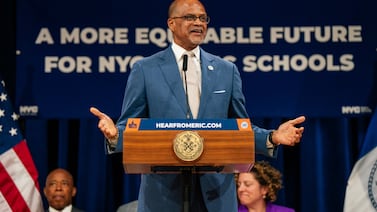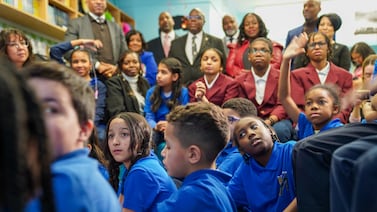Hundreds of angry protesters, most of them high school students, flooded inside Tennessee’s Capitol Thursday calling for stricter gun laws after an armed intruder killed three children and three adults days earlier at a small private school in Nashville.
Chanting “Save our kids!” and “Not one more!” protesters gathered outside of legislative chambers where lawmakers were in session and could hear the students’ shouts reverberating from the Capitol rotunda.
“I’m terrified,” said 17-year-old Keanna Hoskins, who went to the protest instead of attending school that day. Her message to lawmakers: Legally purchased military-style guns, like the ones used in the Nashville shooting, are “completely outrageous.”
“I want them to do something so schoolchildren aren’t slaughtered,” said the Nashville student, “and I really hope I’m not just yelling for no reason.”
Meanwhile, Lt. Gov. Randy McNally and House Speaker Cameron Sexton expressed openness to a so-called red flag law, which would permit a court to order the temporary removal of firearms from a person believed to present a danger to themselves or others. And Republican Gov. Bill Lee, who has huddled daily with GOP legislative leaders following Monday’s slayings at The Covenant School, is revisiting his administration’s sweeping school safety proposal that focuses on fortifying public schools, according to the bill’s sponsors.
“We absolutely have to focus on all schools now, public or private, wherever a child in Tennessee is attending school,” said House Majority Leader William Lamberth, who is carrying the governor’s proposal in his chamber.
Jade Byers, the governor’s press secretary, said Lee will share more “in the coming days” about new proposed safety measures and funding to pay for them.
Shooting exposed holes in state’s safety policies
It was a dramatic day on Capitol Hill as elected officials acknowledged this week’s mass shooting confounded many elements of Tennessee’s school safety policies and proposals, including the governor’s bill to require all K-12 public schools to keep their exterior doors locked, or risk losing escalating amounts of state funding with each violation. The measure also requires that private security guards receive active shooter training before they’re posted at schools.
At The Covenant School, a private Christian school in Nashville’s affluent Green Hills community, there was no armed security officer on site. The intruder entered by shooting out the glass in a locked side door.
The tragedy occurred just two months after the governor’s annual address identifying school safety as one of his top priorities. And last summer, following a mass shooting at a Texas elementary school, Lee signed an executive order directing school officials and local law enforcement to work together to double down on safety protocols.
But the Covenant shooting, according to 17-year-old Allison McMahan, showed the state’s focus on hardening campuses isn’t enough. Stricter gun laws are needed, too, she said.
“There’s actually a gun shop down the street from my school,” said McMahan, who attends Nashville School for the Arts, a local public magnet school. “I feel so uncomfortable seeing that gun shop as I’m going to school every day. I don’t want guns to be so accessible.”
The protest was organized via social media posts inviting students and parents to rally at the Capitol. More than a thousand people showed up outside for a peaceful demonstration before hundreds moved indoors for several hours. Law enforcement removed some noisy protesters from the Senate chamber’s gallery, where several children held signs that said “I’m nine,” in reference to the age of the three children who were killed.
In the rotunda, where most protesters were milling and chanting, they jeered at adults who, with a police escort, emerged occasionally from legislative chambers to go to a nearby restroom.

“You can tell we’re being heard, because they’re not looking us in the eyes when they come out,” said a 16-year-old student named Sophia who declined to give her last name.
She said she hoped to “shame” lawmakers into action and added: “They’re supposed to represent us. Even though we can’t vote, we still live in their state. This is our home, too.”
The Covenant School serves about 200 students in preschool to sixth grade. Killed were students Evelyn Dieckhaus, Hallie Scruggs, and William Kinney; and three school staff members: custodian Mike Hill and substitute teacher Cynthia Peak, both 61, and Katherine Koonce, 60, the head of the school.
Both Peak and Koonce were friends and former co-workers of Gov. Lee’s wife, Maria, a former teacher, when they worked together at another private school, the governor said in a video message to Tennesseans released on Tuesday.
On Wednesday night, Nashville held a citywide vigil, attended by first lady Jill Biden, to remember the victims. And on Thursday, families began to announce funeral plans as the police investigation continued to reveal more about the shooter.
Lawmakers signal openness to red-flag law
Authorities have not identified a clear motive for why Covenant was targeted by a person they identified as Audrey Hale, a former student at the school. Police reported that Hale, who purchased the guns legally, had been under a doctor’s care for an undisclosed “emotional disorder.”
McNally, who leads the Senate, said he would support a red flag law, provided it has safeguards against false reporting.
Sexton said it’s uncertain whether a red flag law could have prevented this week’s attack, but added, “We should be open to any conversation.”
“We need to talk to law enforcement about what tools do they need in those situations where someone is so dire, they’re planning to commit suicide or harm others,” said Sexton, who also wants to look closely at the role of mental institutions in Tennessee.
Democrats, who are significantly outnumbered by Republicans in the legislature, welcomed discussion about ways to lessen the likelihood that a person having a mental health crisis can legally purchase or possess a firearm.
“It’s just common sense,” said Sen. Jeff Yarbro of Nashville, “and doesn’t strike me as infringing on anyone’s rights.”
In an interview with Chalkbeat last summer, the governor said he has “a lot of concerns about red flag laws — not only on issues of mental health but their effectiveness in general.”
Marta W. Aldrich is a senior correspondent who covers the statehouse for Chalkbeat Tennessee. Contact her at maldrich@chalkbeat.org.







